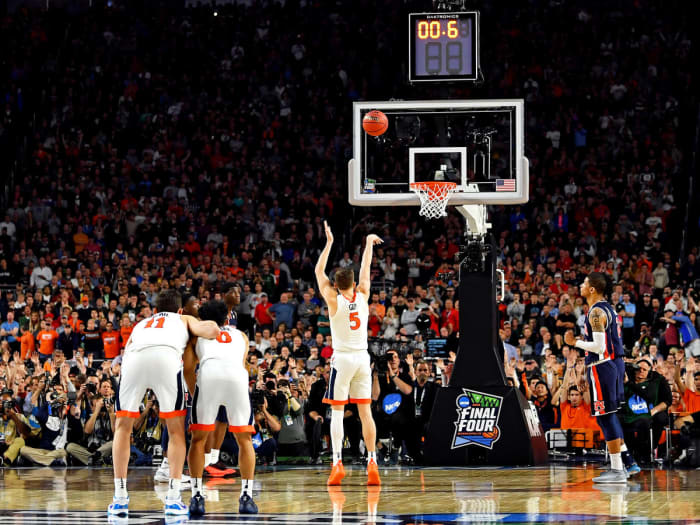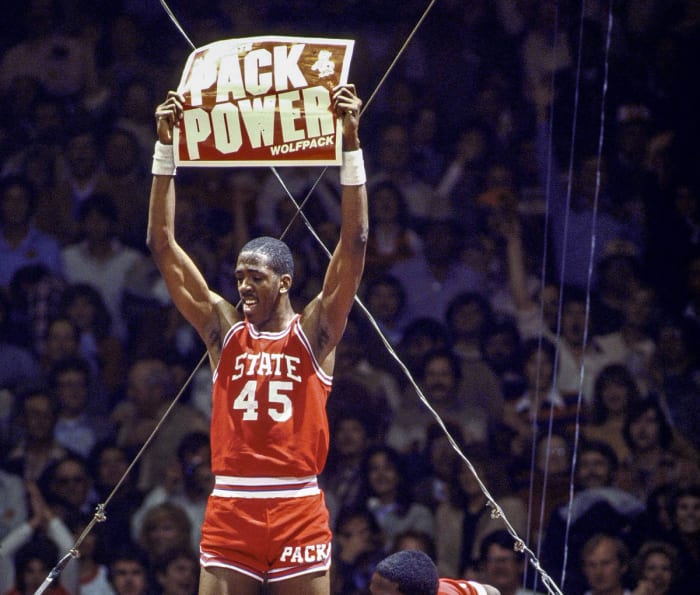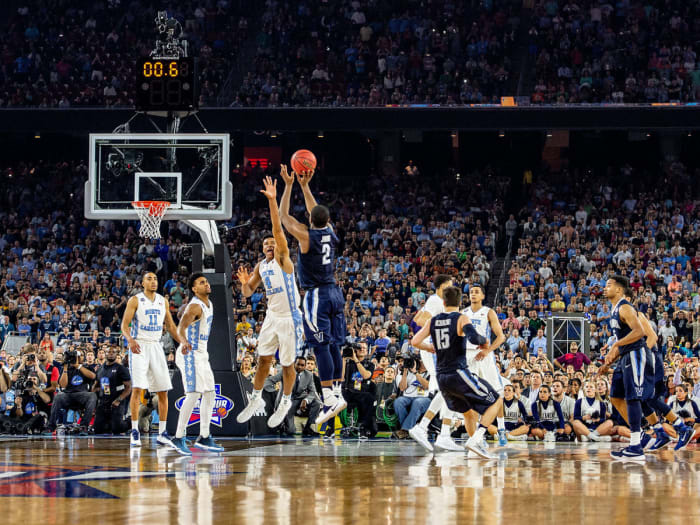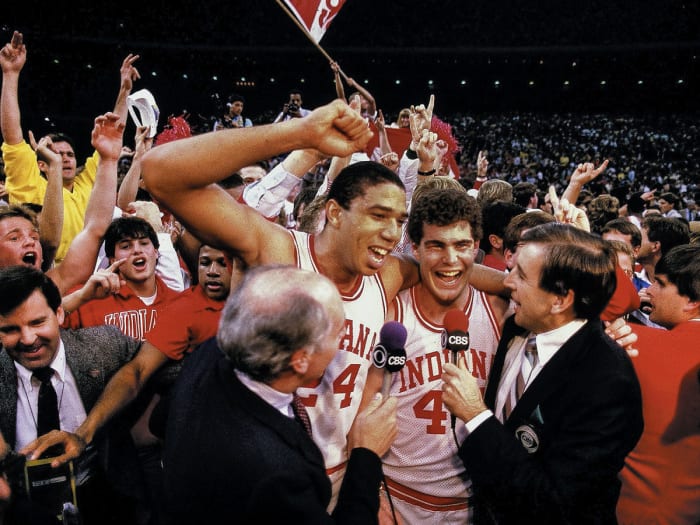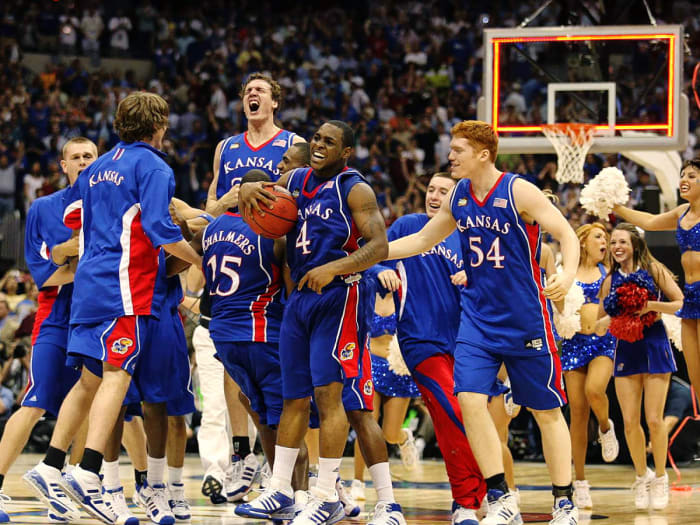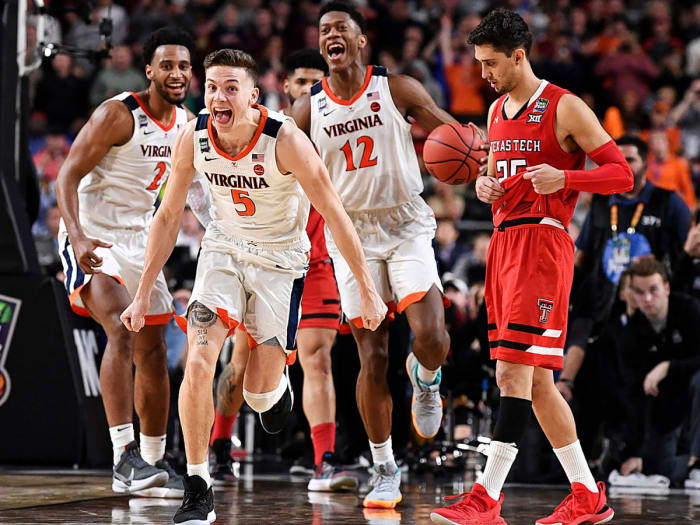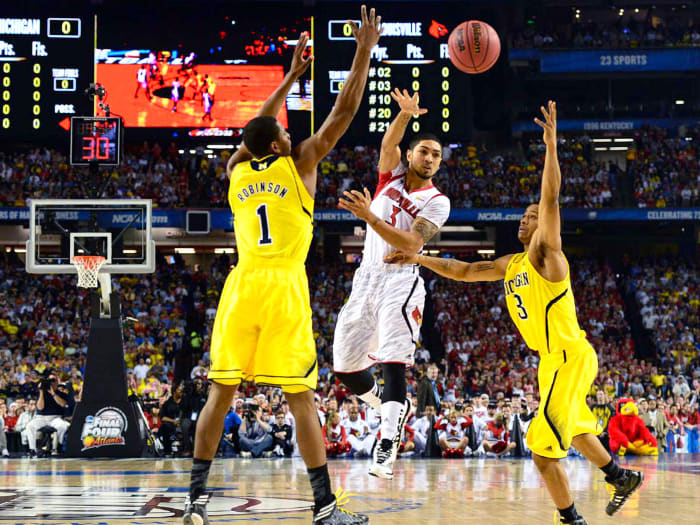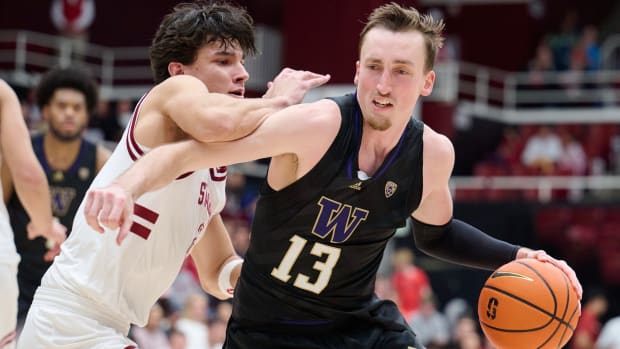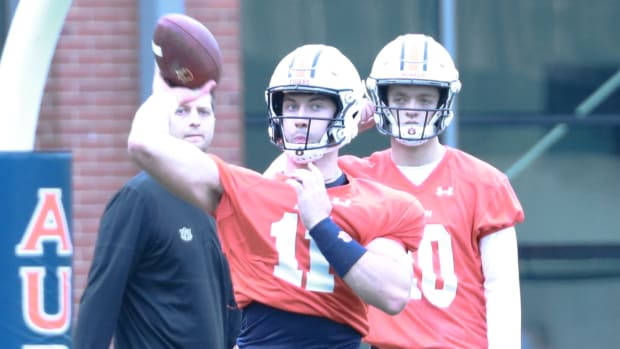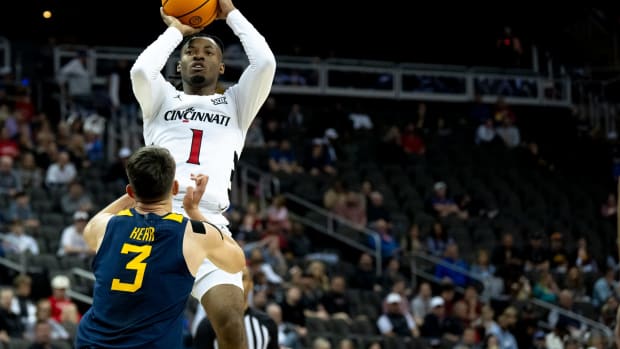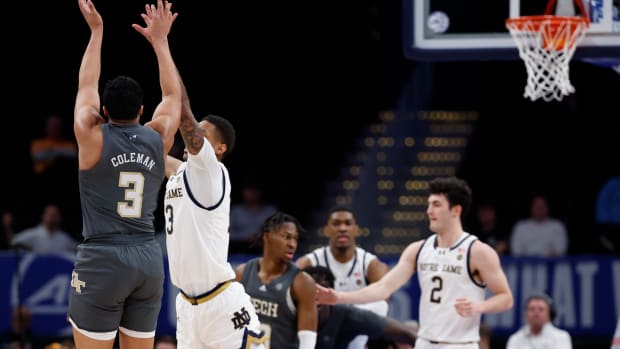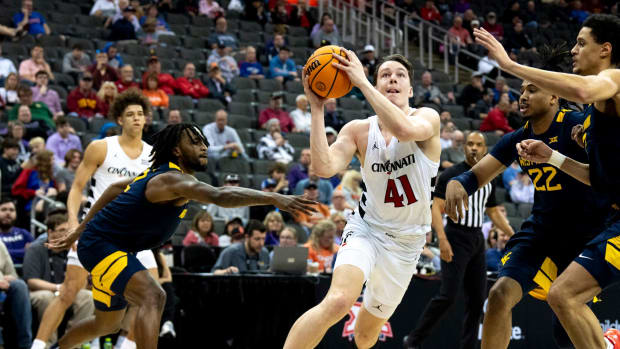The Best Men's Final Four Games of All-Time
The Final Four, which should be starting Saturday in Atlanta, is dearly missed. Thankfully, the NCAA has staged 81 previous tournaments, allowing us to fill the present-day void with a recollection of the best men's Final Four games ever. The 12 best semifinals and 12 best finals are as follows:
Best Semifinals
North Carolina State 80, UCLA 77 (2OT), 1974
The game that decided the ’74 national championship, and ended the Bruins’ seven-year title run. In a clash of two of the greatest talents in college basketball history, the Wolfpack’s David Thompson was the winner and Bill Walton wound up on the losing side for one of the very few times. The skywalking Thompson stood 6-foot-4, but actually blocked a pair of shots by the 6' 11" Walton. NC State won an anticlimactic championship game over Marquette two days later.
Duke 79, UNLV 77, 1991
The Rebels were unbeaten and seemingly unbeatable, especially playing a team they had pounded by 30 for the title the previous season. UNLV was on its way to consecutive national championships and becoming the first undefeated team since Indiana 1976. But Christian Laettner keyed the monumental upset, hitting the winning free throws with 11 seconds remaining. With point guard Greg Anthony fouled out, the ball never found its way into the hands of UNLV All-American Larry Johnson on the final possession.
UCLA 75, Louisville 74, 1975
The Cardinals led by a point when Terry Howard went to the foul line with 20 seconds left and the chance to put his team up three. In the days before the three-point shot, it could have all but iced the victory. Howard had made his last 28 free throws, but he missed the front end of the one-and-one, and Richard Washington scored with two seconds left to propel the Bruins to the title game. John Wooden announced his retirement after the game.
Virginia 63, Auburn 62, 2019
After leading by 10 points with 5:05 remaining, the Cavaliers unraveled. Then with less than a second left and now trailing by two, Auburn’s Samir Doughty committed the ultimate sin—he fouled Cavaliers guard Kyle Guy as he was launching a corner three-pointer. But Guy still had to go the line and deliver—and with more than 70,000 fans in the stadium, nobody has ever had to make game-winning free throws in front of more eyeballs. Guy swished the first two to tie the game. Auburn called timeout. Then Guy swished the last one for the win.
Wisconsin 71, Kentucky 64, 2015
The Wildcats were 38–0 and the prohibitive favorite to win the title and become the first unbeaten team since 1976. But the Badgers were 35-3 and had revenge on their minds after a heartbreaking Final Four loss the previous season (see below). The game dripped tension for every possession, with neither team ever leading by more than eight points. Kentucky was up four with 6:37 left when it seized up offensively, going five-plus minutes without scoring and committing three straight 30-second clock violations. A Sam Dekker three with 1:44 left put Wisconsin ahead for good.
Kentucky 74, Wisconsin 73, 2014
The Wildcats made it into the Final Four thanks to a couple of clutch late shots by Aaron Harrison, and he wound up with the ball in his hands at the end of this one as well. Down two, he took a pass from his twin brother, Andrew, and hit a three-pointer with six seconds left to push Kentucky into the title game, where it lost to Connecticut.
Oklahoma 55, Texas 54, 1947
The Longhorns had beaten the Sooners by 12 points during the regular season, and led this game by seven at halftime. But the Sooners rallied and made it a tight game going down to the wire. A Texas free throw gave the Horns a one-point lead with 25 seconds left, setting the stage for Oklahoma’s final possession. National Player of the Year Gerald Tucker had the ball and seemingly an open shot, but passed it to reserve guard Ken Pryor. He hadn’t made a field goal yet in the NCAA tournament, but took a two-hand jump shot from the wing that banked in for the win.
North Carolina 60, Ohio State 57 (OT), 1946
The Tar Heels’ Bob Paxton is credited with hitting the tying shot with 10 seconds left in regulation to force overtime. But how long was it? Some reports say 30-35 feet, but would he really launch a shot that long with that much time remaining? A book on UNC basketball says only that Paxton made “a critical shot” to tie the game, with no mention of length. Whatever the answer, this win was part of a remarkable Tar Heels tournament run.
Connecticut 79, Duke 78, 2004
The de facto national championship game. UConn had stormed through every NCAA tourney game by at least 16 points, while the Blue Devils had only been challenged once prior to San Antonio. Trailing by eight points with four minutes remaining, UConn pitched a 12-0 shutout late in the game to snatch it away. The Huskies blew out Georgia Tech two days later in the final.
Marquette 51, UNC Charlotte 49, 1977
Grant Hill’s heave to Christian Laettner is the most famous long-bomb pass in NCAA history, but Butch Lee to Jerome Whitehead was 15 years earlier and 15 feet longer. Whitehead pulled down the pass right in front of the rim and laid it in just before the buzzer to break the tie. The result was so stunning that it led to a discussion at the scorer’s table before officials declared the game over—almost a video review with no video.
Michigan 81, Kentucky 78 (OT), 1993
The Wildcats destroyed everyone in their path on the way to New Orleans, winning four games by an average of 28.5 points. The Fab Five, meanwhile, arrived after three straight close scrapes. But they were ready for their close-up, using their length and athleticism to swarm undersized Kentucky point guard Travis Ford. Chris Webber and Jamal Mashburn staged a high-level duel, but Mashburn fouled out in overtime and the Wolverines prevailed.
Kansas 43, USC 42, 1940
The Trojans were 19–2 and considered the team to beat in the eight-team tourney—they were “sun-bronzed giants,” according to the Saturday Evening Post, playing the “midget” Jayhawks. But USC’s draw was difficult. Its opening opponent was another heavyweight, Colorado, and after surviving that game USC had to play the following night against the Jayhawks in Kansas City, just 40 miles from the Kansas campus. The Jayhawks pulled the upset after a steal by Phog Allen’s son, Bob, and a late shot by Howard Engleman.
*****
Best Finals
North Carolina State 54, Houston 52, 1983
Give this one the slight edge over Villanova-North Carolina for two reasons: the upset was enormous, foreseen by very few; and the stunning nature of the winning basket. College basketball history is rife with big jump shots for the win, but Lorenzo Charles dunking an airball at the buzzer remains unique. The number of narrow escapes the Wolfpack made—starting in the ACC tournament—only adds to the storyline. All that said, this was not exalted basketball. Guy Lewis won a lot of games, but letting Clyde Drexler get four fouls in the first half is one of the worst in-game blunders ever.
Villanova 77, North Carolina 74, 2016
Kris Jenkins’s 27-foot shot for the win is the longest title-game buzzer beater of all-time—that’s what we’ll remember and watch for decades to come. But the heroics of Marcus Paige to force a tie and set up that bomb should not be forgotten, either. With ‘Nova leading by six with 100 seconds to go, Paige scored eight points in 89 seconds, each basket more difficult than the one before, capped by a double-pump, jack-knife three-pointer with six seconds left. That set the stage for the dramatic conclusion.
Indiana 74, Syracuse 73, 1987
Charles’s dunk was more sudden and Jenkins’s shot was longer—but there was more pressure on Keith Smart’s final shot than either of those. Indiana was trailing, not tied, on its final possession. Steve Alford was Indiana’s star, but Smart had already scored 10 of the Hoosiers’ last 13 points and it was clear he wanted the ball in his hands at the end against the Syracuse zone. Smart finally got his opening near the baseline from about 17 feet out, swishing the shot with four seconds left. Syracuse was left to live with the fact that it went 11-20 from the foul line, including a late Derrick Coleman miss that set up Smart’s shot.
North Carolina 63, Georgetown 62, 1982
This was the first time the NCAA took its Final Four to a domed stadium, and the title game delivered on an appropriate scale. There, 61,000 fans were in the stands and three NBA Hall of Famers on the floor, plus other future pros as well. Georgetown freshman Patrick Ewing was a powerhouse, recording 23 points and 11 rebounds, but it was a Carolina freshman who came off the bench to steal the show. Michael Jordan’s game-winner from the wing with 15 second left was the start of a GOAT of a career for No. 23.
Villanova 66, Georgetown 64, 1985
This was another massive upset—Georgetown already had beaten ‘Nova twice during the season, was on a 16-game winning streak and hadn’t been ranked lower than No. 2 all season. It took an incredible offensive performance by the Wildcats to pull it off. They shot an astounding 78.6% from the field, and did it against a defensive juggernaut that came in allowing opponents to only make 39.8% of their shots. To this day, No. 8 seeded Villanova remains the lowest-seeded team to win the tournament.
Loyola Chicago 60, Cincinnati 58 (OT), 1963
The game was historically significant, with the Ramblers becoming the first national champion to use a majority African-American starting lineup. But it was also a stellar performance by an underdog team against the two-time defending national champions. Loyola trailed by 15 with 14 minutes to play, and didn’t take its first lead until overtime. The Ramblers, who played the same five men for all 45 minutes, won on a putback basket by Vic Rouse at the buzzer.
Kansas 75, Memphis 68 (OT), 2008
Mario Chalmers’s shot to force overtime is an all-timer, of course, the highlight of fierce battle between teams that combined had lost just four times all season. But the Memphis meltdown at the end is a big part of the story: up nine with two minutes to go and up six with 1:25 left, the Tigers missed five straight free throws in one stretch; neglected to use their final timeout to set up their defense; and failed to foul up three on the final possession of regulation.
Connecticut 77, Duke 74, 1999
The hype machine had already been in high gear for this 37-1 Blue Devils team, labeling it an all-time great and spawning discussion of whether it might be the best ever. Then it ran up against a team that forever changed the trajectory of the UConn program. Duke had several future pros, but Huskies wing Richard Hamilton was the best player on the floor (27 points, seven rebounds). From this game through the present, UConn has won more national titles (four) than Duke (three).
North Carolina 75, Illinois 70, 2005
Throughout the 2004-05 season, these were the two best teams. They stayed on their collision course despite some tense tourney moments: the Tar Heels were fortunate to survive Villanova and Wisconsin in the East Region semis and final; the Illini needed a furious rally to beat Arizona in the Midwest Region final. The title game did not disappoint—UNC led by 15 early in the second half and 10 with 8:51 left, but a determined Illinois rally gave Luther Head a shot at a tying three with 17 seconds left. He missed, and Carolina held on for Roy Williams’s first title.
Virginia 85, Texas Tech 77 (OT), 2019
This was expected to be a defensive stranglefest—low scoring, low shooting percentages, slow pace. It became a compelling offensive game, with both teams figuring out how to exploit key matchups. Virginia led by 10 with with 9 1/2 minutes to play and by four with 1:35 to play, then the Red Raiders scored seven straight and looked like they might steal it. But D’Andre Hunter hit a three-pointer with 12 seconds left to force overtime. In regulation, Virginia’s final four games of the tournament ended with the Cavaliers outscoring opponents by a total of five points.
Louisville 82, Michigan 76, 2013
There is an asterisk next to Louisville’s name in the record books, but the first half of this game was among the most entertaining ever. The underdog Wolverines roared to a 12-point lead behind a stunning 17 points from freshman bench jockey Spike Albrecht (he would go on to play 103 more college games and only once score more than 17 in any of them.) Then Louisville came back with its own startling barrage, with Luke Hancock making four straight threes to key a 17-3 run. The second half was tense until the Cardinals wore down Michigan late. The three games in the ’13 Final Four were decided by a total of 15 points.
North Carolina 54, Kansas 53 (3OT), 1957
A triple-overtime championship game between blue bloods that featured Wilt Chamberlain and was decided by a point—had to be a classic, right? Well, not really. The score of the first overtime was 2-2. The score of the second overtime was 0-0. It wasn’t until the third OT that the teams got back to playing basketball, with the Heels winning on two free throws by Joe Quigg with six seconds left. (That was the second triple OT game of the Final Four for UNC, which beat Michigan State 74-70 the previous day. A Pete Brennan jump shot beat the buzzer and forced the first overtime in that one.)
- A note about Texas Western 72, Kentucky 65, 1966: It was the most important game in the history of the sport, with the underdog Miners becoming the first team to win it all the first all-black starting five—and doing so against all-white Kentucky. But the game itself wasn’t terribly dramatic. Texas Western took a 10-9 lead and never trailed again, with the final minutes being more a formality than anything.
